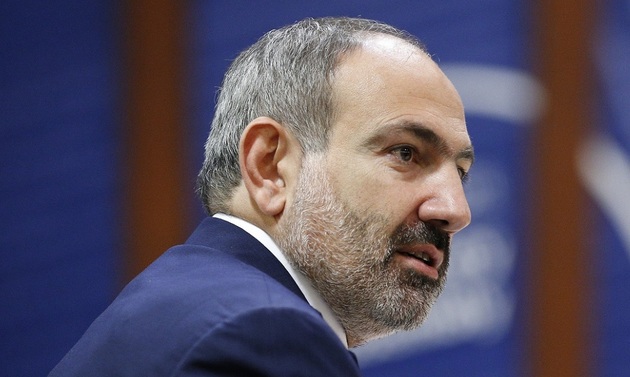Today, Acting Prime Minister of Armenia Nikol Pashinyan once again made a proposal for a "mirror withdrawal of troops" and the deployment of Russian border guards or international observers along the border. According to him, this will allow starting the process of border demarcation.
We are talking about the withdrawal of troops in the Sotk-Khoznavar section (Gegharkunik and Syunik regions of Armenia), after which Armenia proposes to deploy Russian border guards or international observers along the border. This, according to Pashinyan, will create conditions for the start of the process of border demarcation and delimitation.
Attention is drawn to the fact that the Armenian prime minister again began to force the topic of "international observers". Moreover, this is happening against the background of a diplomatic leak circulated in the Russian media about the forthcoming Armenian-French initiative to adopt a new UN Security Council resolution on the situation in Karabakh and on the Armenian-Azerbaijani border. In parallel, the head of the European Council of the EU Charles Michel, who promised Yerevan generous assistance in the amount of 2.6 billion euros, during his regional visit also expressed the EU's readiness to place its observers in the region.
Meanwhile, Moscow has so far not shown serious interest in Yerevan's request to deploy Russian troops along the Armenian-Azerbaijani border. In our opinion, there are several reasons for this.
First, the Russian army is already "loaded" with current regional challenges. This is the almost two thousandth peacekeeping contingent in Karabakh, and the strengthening of the military presence in Central Asia, which is faced with the threat of penetration by the Taliban militants (the organization is banned in Russia), not to mention the tense border with Ukraine. Instead of sending another group of its servicemen to please Armenia, Russia prefers to reason with Pashinyan, who has already somewhat retired from defeat in the Karabakh war and has again become stubborn on the promises of his European allies.
Here one cannot but recall the rather significant statement of the press secretary of Vladimir Putin, Dmitry Peskov, that Moscow will be ready to welcome the EU peacekeeping initiatives ... if they contribute to the implementation of the trilateral agreements of November 9, 2020. That is, through the mouth of Peskov, Moscow made it clear to Brussels that the corridor of its potential "peacekeeping activity" is limited by the trilateral agreement of November 9 last year, the implementation of which, according to Peskov, "is already going well." Translated from the diplomatic language, this means that if the signals coming from the European Union push Yerevan to intransigence in the negotiations with Baku under Russian moderation, then European peacekeeping, accordingly, will not be welcomed.
The Kremlin also understands that the Armenian side, with its proposal for additional deployment of the Russian military, is trying to drag out the process of border demarcation for an indefinite time, using the Russian "military" umbrella. This approach is in no way in the interests of Moscow. The Russian leadership understands that the effective demarcation of the border and the opening of regional communications in accordance with the trilateral statements of November 9, 2020 and January 11, 2021 are closely interrelated processes, the separation of which will undermine the regional structure being built by Vladimir Putin. The second "option" - the deployment of European observers - should play the role of Pashinyan's "diplomatic whip" for Moscow. If Russia does not deploy its military, then Westerners will come to the region. It cannot be called anything other than Pashinyan's dangerous and stupid game - primarily for the Armenian statehood.
While Armenia is rather clumsy trying to maneuver between Russia and the West, Vladimir Putin and Ilham Aliyev "synchronized watches" on the issue of unblocking communications during the recent working visit of the Azerbaijani President to the Russian capital. In the reports of the Azerbaijani media, the idea is that Baku is satisfied with the results of Aliyev's visit. Local journalistic publications and leaks emphasize a common vision of the two leaders on the problem of the Zangezur Corridor between Azerbaijan and the Nakhchivan Autonomous Republic (and, accordingly, Russia and Turkey). In Moscow, Vladimir Putin personally thanked Ilham Aliyev for the fact that the Azerbaijani leader can always come up with compromise solutions, in fact, emphasizing the constructive approach of Azerbaijan. Whether the Armenian leadership will be able to demonstrate the same attitude is a question, the answer to which will predetermine the further development of events on the Armenian-Azerbaijani border and in Karabakh.






